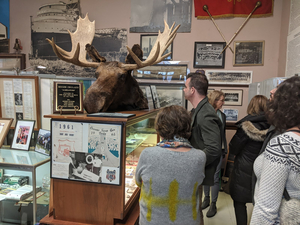Gaylord and Dorothy Donnelley Foundation Announce New Collections Funding Initiative
Foundation to award $750,000 annually in grants to museums, libraries and other collecting organizations to showcase BIPOC, LGBTQ+ and more.

The Chicago-based Gaylord and Dorothy Donnelley Foundation (the Foundation) has announced today the launch of a major new Collections funding initiative to help museums, libraries, and other collecting organizations bring forward new and recovered narratives within the Foundation's two geographies: Chicago and the Lowcountry of South Carolina. The Foundation has allocated $750,000 for grants to organizations whose collections illustrate BIPOC communities, LGBTQ+ perspectives, working-class narratives, small community experiences, as well as other underrepresented groups and viewpoints. Emerging, compelling, underrepresented perspectives reflective of collections in the areas of science, public health and the natural world also are eligible. Any Chicago or Lowcountry based non-profit organization with a relevant collection is encouraged to learn more about the strategy at gddf.org. The first deadline for applications is March 26, 2021.
Collections traditionally have ensured that stories are preserved, added to, revisited, and reconsidered in context of the past, the present, and the future. Some narratives, however, have been less valued or overlooked because of decisions based-consciously or subconsciously-on race, gender, sexual identity, educational background, economic or social status, or because they are perceived to be unpopular, divisive or outside the conventional thinking of the day. This new funding initiative is designed to be part of a new way forward in collections thinking as it shifts focus from the care and processing of material objects to the telling of broader and more inclusive narratives and perspectives through collections.
"The launch of this 'broadening narratives' initiative arrives serendipitously as our country faces a historic moment of social justice reawakening and a compelling need for trusted institutions to educate the public on science-based realities, whether Covid-19 or climate change," said David Farren, Executive Director of the Foundation. "With this new strategy, we will recognize and be responsive to the emerging opportunities, challenges, and narratives of both the Lowcountry and Chicago regions."
Chicago's broad tapestry of ethnic groups is reflective of the city's industrial and commercial history and the immigration and migration it sparked, while the Lowcountry's history is rooted in the country's oldest experiences of race and power. Applicants for the new funding will be asked to demonstrate how the proposed effort may add to these regional narratives and amplify overlooked voices and perspectives from the past, contribute to a better informed present, or lead to a more inclusive, sustainable and healthier future.
An organization will be eligible to apply as long as collections are a significant part of their mission-though it need not be their primary mission-and they have resources dedicated to the ongoing care, management, and sharing of the collection. Those who work with the collections may include creatives, individual artists, curators, historians, teachers, social activists, researchers, scientists, and more, though grants will be made only to organizations. In advance of the application deadline, the Foundation will host a virtual event on October 21, 2020 for Collections organizations to learn more about the strategy. For more information or to inquire about reservations, please email info@gddf.org by October 16, 2020.
For over three years, the Foundation has convened five advisory groups to assist with the formation of this new funding initiative by providing important feedback, keeping the Foundation apprised of trends in the field, and serving as valuable connectors and conveners. The groups include Black Metropolis Research Consortium, Chicago Collections Consortium, Chicago Cultural Alliance, the College of Charleston's Lowcountry Digital Library, and the Southeastern Museums Conference.
"Working with the Foundation on this strategy has highlighted the value of collaboration and deliberation among diverse collections organizations and their potential to amplify marginalized voices," said Marcia Walker-McWilliams, Executive Director of Black Metropolis Research Consortium. "There is an urgent need for more inclusive and informed spaces of engagement within the field. We have worked tirelessly to discover where this new initiative is needed most, and are eager to carry those discoveries into the next phase with our fellow advisory groups and the Foundation."
Comments
Videos

